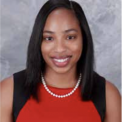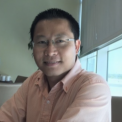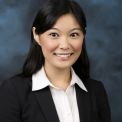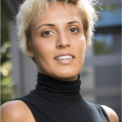Events Calendar View
-
CSP Lunch Seminar
Feb 9, 2021
Generic Structural Transitions of Helical Polymers with Confined Torsion Strength
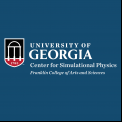
Guest: Yifan Dai, Center for Simulational Physics, University of Georgia
Tuesday, February 9, 2021 12:45 pm - 1:45 pm
Location: Zoom Meeting -
Meeting
Feb 10, 2021
Meet Alumna Dr. Whitney Ingram
Whitney Ingram, a Georgia native raised in Stone Mountain, graduated from the University of Georgia with her BS in Physics in 2011 and PhD in Physics in 2016. She holds the honorable distinction of being the first African American female to graduate from UGA with a PhD in physics. Her research focus and dissertation were on the fabrication and application of plasmonic nanomaterials using nanosphere lithography. Whitney has authored and co-authored over 15 publications under the training of her mentor Dr. Yiping Zhao. Most notably in 2015, she was selected as one of 65 students from the United States to attend the Nobel Laureate Conference in Lindau, Germany. Currently, Dr. Ingram is a senior R&D engineer at Sandia National Laboratories (SNL), which is a government research facility that specializes in advanced defense and intelligence technology, in addition to keeping the US nuclear stockpile safe and secure. In addition to her dedication to work, Ingram has remained dedicated to encouraging STEM for the next generation.
If you have any questions or need additional information, please contact Debbie Daniel, Director of Alumni Engagement at dadaniel@uga.edu or call (706) 542-9449.
-
Departmental Colloquium
Feb 11, 2021
Recent Discoveries in Two-Dimensional van der Waals Magnets: Opportunities and Challenges
Two-dimensional (2D) magnetic van der Waals materials, especially transition metal dichalcogenides (TMDCs), and their heterostructures are emerging candidates for ultralow-power and ultra-compact device applications. Although theory predicts suppression of long-range magnetic order at finite temperatures in such 2D materials, recent experiments have demonstrated the existence of long-range ferromagnetic order in bulk van der Waals materials (e.g., CrI3) at the monolayer limit [1,2]. However, these materials require cryogenic temperatures or other special protections to function. Therefore, it becomes crucial to have control over their unique atomic- level magnetism at temperatures close to room temperature, at which most of our devices operate. To this end, our recent discoveries of the strong room temperature ferromagnetism in metallic monolayers of VSe2 grown on van der Waals substrates (graphite, MoS2) [3] and semiconducting monolayers of V-doped WSe2 or WS2 grown on SiO2 substrates [4,5] have the potential to transform the fields of spintronics, valleytronics and quantum computation. In this talk, I will present the research progress on 2D magnetism, including our new findings of the light-controlled room temperature ferromagnetism in 2D V-doped TMDCs, the tunable exchange bias effect and light-mediated magnetism in VSe2/MoS2 heterostructures, as well as the development of a new class of highly sensitive magnetic sensor using a single layer magnet of VSe2 [6]. Opportunities and challenges in this rapidly expanding research field will be discussed.
About the Speaker
Dr. Phan is Professor of Physics at the University of South Florida. He received B.S., M.S., and Ph.D. degrees in Physics from Vietnam National University (2000), Chungbuk National University – South Korea (2003), and Bristol University – UK (2006), respectively. His research interests lie in the physics and applications of magnetic materials, with an expertise on the development of novel magnetocaloric and magnetoimpedance materials for energy-efficient magnetic refrigeration and smart sensor technologies. He has published more than 280 peer-reviewed journal papers (over 10,000 citations, h-index: 51 from Google Scholar), 7 review papers, 5 book chapters, and 1 text book. Presently, he serves as an Editor for the Journal of Electronic Materials, the Editor for Applied Sciences, the Managing Editor for Journal of Science: Advanced Materials and Devices, and the Editorial Board Member of Nature: Scientific Reports. He has recently been awarded an Honorary Doctoral Degree by Vietnam National University - Hanoi (2021). He was also the recipient of The Two USF Outstanding Faculty Research Achievement Awards (2017, 2019), the recipient of The USF Outstanding Graduate Faculty Mentor Award (2018, HM), and the recipient of The Medal for His International Contribution and Recognition by Vietnam National University - Hanoi (2018). He has delivered plenary, keynote and invited talks at professional meetings on Magnetism and Magnetic Materials (MMM, ICM, APS, MRS, INTERMAG, TMS, ICAM, ICAMR, ISAMMA, IcAUMS) and organized numerous international conferences on Nanomaterials, Energy, and Nanotechnology.
-
Departmental Colloquium
Feb 18, 2021
Using machine learning to build robust interatomic potentials
Machine learning is emerging as a powerful tool for emulating electronic structure calculations. I will discuss recent work in building interatomic potentials relevant to chemistry, materials science, and biophysics applications. A key idea is active learning, in which the training data is iteratively collected to address weaknesses of the ML model. This approach can achieve a surprising level of transferability, as will be demonstrated with a case study for elemental aluminum.
About the speaker:
Kipton Barros has interests in computational physics, applied math, and computer science, and currently works in the Physics and Chemistry and Materials group at Los Alamos National Lab. A recent focus is applying machine learning to accelerate simulations and scientific discovery. Over the past few years, collaborations have spanned topics such as seismology, molecular dynamics simulation, fluid dynamics, and correlated electron physics. -
Departmental/CSP Colloquium
Feb 25, 2021
From Monte Carlo to machine learning: how computational methods advance the study of statistical physics
In statistical physics, Monte Carlo methods have been an important computational techniques to study the thermodynamics and properties of matter. They use random sampling to generate a collection of physical states of a system, from which finite- temperature properties of materials can be calculated. The statistical analysis associated with Monte Carlo simulations naturally extends to the use of machine learning methods that have been rapidly advancing in recent years. Additionally, these two methods complement each other to facilitate new algorithms, capabilities, as well as applications to frontier research problems. In this colloquium, I will review the basic principles and developments of both Monte Carlo and machine learning methods, and highlight some of our current studies in condensed matter physics enabled by the combination of these two methods.
Bio:
Ying Wai Li has a Ph.D. in Computational Physics. She is a UGA Physics and Astronomy alumni, and is currently Deputy Team Leader of the Future Architectures and Applications Team at Los Alamos National Laboratory. Li’s research interests span condensed matter physics, algorithm design, and high-performance computing. Her expertise is in the state-of-the-art classical and parallel Monte Carlo algorithms, first principles methods, and recently the application of machine learning to computer simulations and data analytics for the study of thermodynamics and phase transitions of material properties. -
Departmental Colloquium
Mar 4, 2021
Controlling Correlations: Linear-, Nonlinear-, and Hydrodynamics in Quantum Materials
The physics of quantum materials hosts spectacular excited-state and nonequilibrium effects, but many of these phenomena remain challenging to control and, consequently, technologically under-explored. My group’s research, therefore, focuses on how quantum systems behave, particularly away from equilibrium, and how we can harness these effects1. By creating predictive theoretical and computational approaches to study dynamics, decoherence and correlations in materials, our work could enable technologies that are inherently more powerful than their classical counterparts ranging from scalable quantum information processing and networks, to ultra-high efficiency optoelectronic and energy conversion systems. In this talk, I will present work from my research group on describing, from first principles, the microscopic dynamics, decoherence and optically-excited collective phenomena in quantum matter at finite temperature to quantitatively link predictions with 3D atomic-scale imaging, quantum spectroscopy, and macroscopic behavior. Capturing these dynamics poses unique theoretical and computational challenges. The simultaneous contribution of processes that occur on many time and length-scales have remained elusive for state-of- the-art calculations and model Hamiltonian approaches alike, necessitating the development of new methods in computational physics2–4. I will show selected examples of our approach in ab initio design of active defects in quantum materials5–7, and control of collective phenomena to link these active defects8–10. Building on this, in the second part of my seminar, I will show our predictions of linear and nonlinear dynamics and transport in Weyl semimetals11–14. I will discuss the anomalous landscape for electron hydrodynamics in systems beyond graphene, highlighting that previously- thought exotic fluid phenomena can exist in both two-dimensional and anisotropic three-dimensional materials15. Our work identifies phonon-mediated electron-electron interactions16–18 as critical in a microscopic understanding of hydrodynamics. Non-diffusive electron flow, and in particular electron hydrodynamics, has far-reaching implications in quantum materials science, as I will show in this talk. Finally, I will present an outlook on driving topological quantum materials far out-of-equilibrium to control the coupled degrees-of-freedom19,20.
About the Speaker
Prineha Narang is an Assistant Professor at the John A. Paulson School of Engineering and Applied Sciences at Harvard University. Prior to joining the faculty, Prineha came to Harvard as a Ziff Fellow and worked as a Research Scholar in Condensed Matter Theory at the MIT Department of Physics. She received an M.S. and Ph.D. in Applied Physics from the California Institute of Technology (Caltech). Prineha’s work has been recognized by many awards and special designations including a National Science Foundation CAREER Award in 2020, being named a Moore Inventor Fellow by the Gordon and Betty Moore Foundation, CIFAR Azrieli Global Scholar by the Canadian Institute for Advanced Research, a Top Innovator by MIT Tech Review (MIT TR35), and a Young Scientist by the World Economic Forum in 2018. In 2017, she was named by Forbes Magazine on their “30under30” list for her work in quantum science and engineering. Outside of science, she is an avid triathlete and runner.
Website: narang.seas.harvard.edu
Page 107 of 121, showing 6 records out of 723 total, starting on record 637, ending on 642


